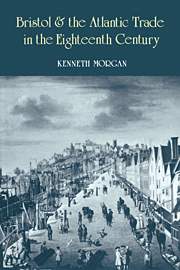Book contents
Introduction
Published online by Cambridge University Press: 12 October 2009
Summary
Favoured with a long history of maritime commerce and a westward geographical outlook, Bristol played a significant role in the exploration, colonisation and trade of the New World from the time of the Cabot voyages onwards. In the late sixteenth and seventeenth centuries, Bristol's main commercial interests in the Atlantic were the search for the Northwest Passage, involvement in the fisheries off Newfoundland and New England, and early trade connections with the Chesapeake and the Caribbean. Between 1660 and 1700, trading links with the colonies grew apace and helped Bristol and England to gain access to a wider commercial world. But it was during the eighteenth century that Bristol became a bustling gateway of empire trading with all the British colonies in North America and the West Indies, with the slave coast of West Africa, and with the Atlantic wine islands and the Iberian peninsula (which were integral parts of the transatlantic shipping network). Burgeoning oceanic commerce helped to develop wealth and prosperity in the Bristol mercantile community. It was a major impetus behind the investment of merchants in banking in the city after 1750 and in their participation in various industrial enterprises. It also enabled many of them to acquire country estates, fine Georgian town houses and urban residences among the terraces and crescents of Clifton.
Bristol's increasing commercial connections with North America and the West Indies reflected a similar shift in the overall pattern of British overseas trade. Though English domestic exports and retained imports both quadrupled in value during the eighteenth century, the transatlantic sector expanded while trade with Europe experienced relative decline.
- Type
- Chapter
- Information
- Publisher: Cambridge University PressPrint publication year: 1993



